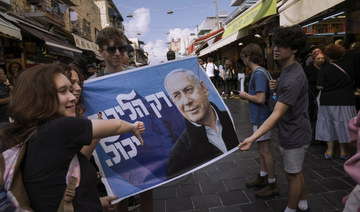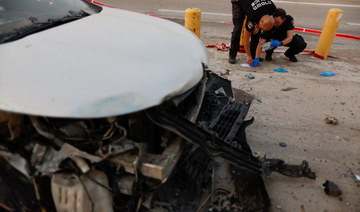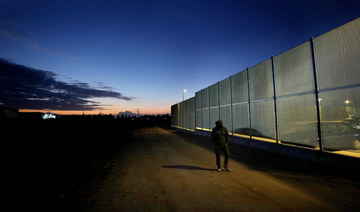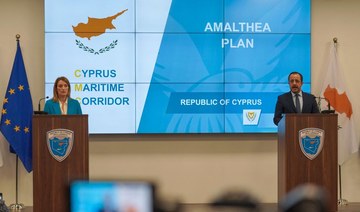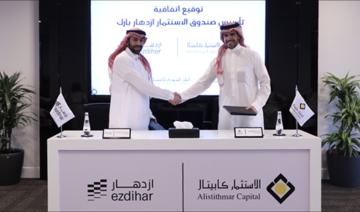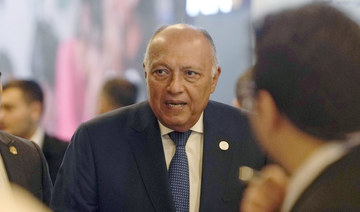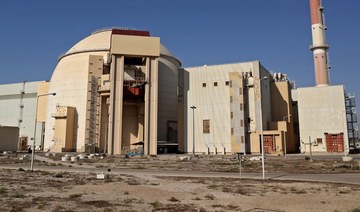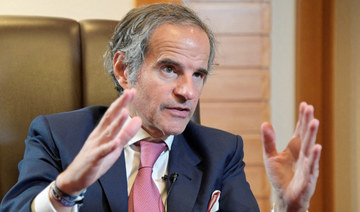RAMALLAH: The prospect of Benjamin Netanyahu returning to power as head of one of the most right-wing coalitions in Israeli history has prompted concern among Palestinians who fear it could be a prelude to an escalation of their conflict with Israel.
More than 100 Palestinians from the Israeli-occupied West Bank have been killed by Israeli forces this year.
Palestinian Prime Minister Mohammad Shtayyeh said the rise of right-wing parties was “a natural result of the growing extremism and racism in Israeli society, which the Palestinians have been suffering from for years.”
But Palestinians “would not stop their legitimate struggle to end the occupation, gain freedom and establish their independent state with Jerusalem as its capital regardless of the identity of the winners in the Israeli elections.”
He added: “The difference between the Israeli parties is the same as the difference between Pepsi-Cola and Coca-Cola.
“We had no illusions that the ballot boxes in the Israeli elections would produce a partner for peace in light of the aggressive policies and practices that our people suffer from, which do not give weight to international decisions and laws.
“The results of the Israeli elections confirmed that we have no partner in Israel for peace and that the international community must assume its responsibility to implement international resolutions and protect our people after the rise of racist parties to power in Israel.”
The Palestinian leadership has always supported and maintained ties with Israel’s left-wing parties in the hope of a resumption of peace talks.
Ahmed Al-Deek, an adviser to the Palestinian foreign minister for political affairs, told Arab News: “We will determine our position on the upcoming Israeli coalition based on its policies and stances on the Palestinian issue.
“We view with great gravity this emergence of Israeli fascism represented by Ben Gvir and Smotrich, and we consider it one of the expressions of the deep crisis that Israelis are experiencing as a result of the continuation of the occupation and the establishment of the apartheid regime in the Palestinian territories.”
Israeli lawmaker Itamar Ben-Gvir calls his Arab colleagues “terrorists” and advocates deporting political opponents. In his youth, his views were so extreme that the army banned him from compulsory military service.
Bezalel Yoel Smotrich is a radical right-wing politician who heads the Religious Zionist Party and previously served as a Knesset member for Yamina.
Hamas, which governs Gaza, holds a similar position to President Mahmoud Abbas’ Fatah on the Israeli poll.
Hamas official Bassim Naiem told Arab News that the results of the election showed the “true face of Israel.”
“Those who showed great sadness over these results or expressed great surprise, locally and internationally, are either naive or politically ignorant, who didn’t read the history of the Zionist movement and project, and if they did, they didn’t understand it,” he said.
Mustafa Barghouti, secretary-general of the Palestinian National Initiative, said the elections would not change anything because they were taking place between two extremist right-wing groups and in the absence of a true peace camp.
He added that the most troubling thing was that a criminal fascist party headed by Smotrich and Ben-Gvir might get third place, indicating the degree of descent of colonial Israeli society toward racial extremism and the doctrine of ethnic cleansing and apartheid.
Al-Deek said: “There is no power in the world capable of canceling the presence of the Palestinian people on their land and homeland, and they will continue to struggle by all means to confront the occupation until the double standards in international standards are broken.”
Palestinians also expressed anger at the fact that their occupier has held five elections in less than four years while they have not held any since 2006.
Amer Hamdan, a legal activist from Nablus, said on Facebook: “How will we feel about ourselves when we watch millions of Israeli citizens going to the polling stations … and we cannot choose who represents us; neither in the West Bank nor the Gaza Strip?”
Another Palestinian commented sarcastically: “The elections are taking place to choose the best, and as long as the best is currently ruling us, what is the need for elections?”
Another said: “We don’t need democracy, we have perfect leadership, but the problem is that the people are not able to understand them properly.”
Another comment read: “They (Fatah and Hamas) divided it. The West Bank is for the Palestinian Authority, and Gaza is for Hamas, and each side is satisfied with its share.”
Palestinians fear escalation of violence as Netanyahu closes in on victory
https://arab.news/n6sbe
Palestinians fear escalation of violence as Netanyahu closes in on victory
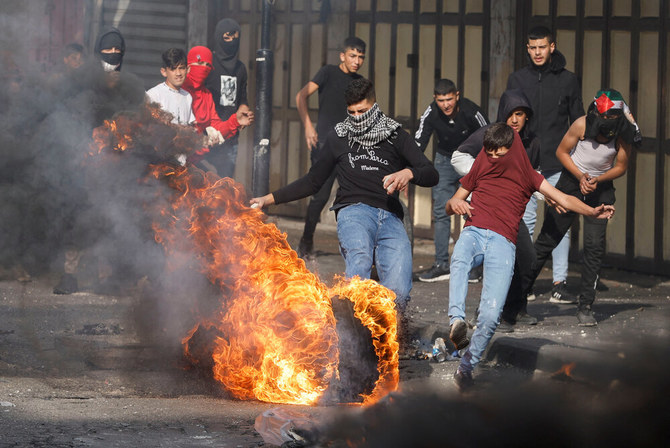
- Rise of right-wing ‘result of growing extremism’ in Israel, PM Shtayyeh says
- Election result confirms ‘we have no partner in Israel for peace,’ he says
Israeli offensive on Rafah is bad idea, French foreign minister tells PM Netanyahu

JERUSALEM: An Israeli offensive in Rafah is a bad idea and would not resolve anything in the country’s fight against Hamas, France’s foreign minister told Israeli Prime Minister Benjamin Netanyahu on Tuesday, according to a French diplomatic source.
“It is a bad idea to do it. There are too many uncertainties over the humanitarian issues,” Stephane Sejourne told Netanyahu during a meeting at the prime minister’s office in Jerusalem, the source with direct knowledge of the conversation said.
EU’s von der Leyen to unveil aid for Lebanon to stop refugee flows, says Cyprus
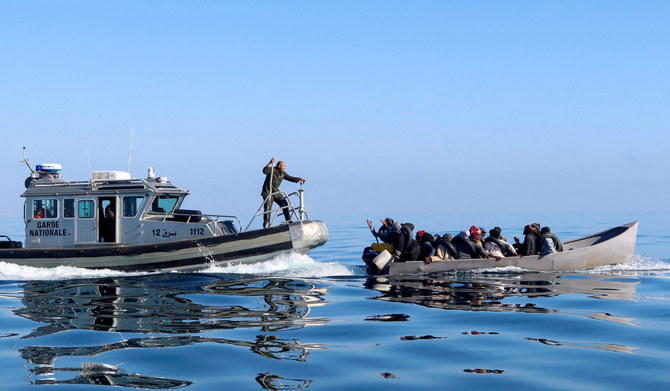
- Discussions would focus on challenges Lebanon presently faces and stability reforms it needs
- Nicosia has lobbied the bloc for months to extend aid to Lebanon similar to deals the EU has with Turkiye, Tunisia, and more recently, Egypt
NICOSIA: The European Union will offer economic aid for Lebanon when the head of the bloc’s executive and the Cypriot president jointly visit Beirut on Thursday, a Cypriot official said on Tuesday.
EU member Cyprus has grown increasingly concerned at a sharp increase in the number of Syrian refugees making their way to the Mediterranean island. Lebanon, a mere 100 miles (185 km) away from Cyprus, hosts hundreds of thousands of Syrian refugees.
“The President of the European Commission will present an economic aid package for Lebanon,” Cypriot government spokesperson Konstantinos Letymbiotis said in a statement.
President Ursula von der Leyen, due in Cyprus on Wednesday, would jointly travel to Beirut with the Cypriot President, Nikos Christodoulides on Thursday morning.
Discussions would focus on challenges Lebanon presently faces and stability reforms it needs, Letymbiotis said.
Nicosia has lobbied the bloc for months to extend aid to Lebanon similar to deals the EU has with Turkiye, Tunisia, and more recently, Egypt.
“The implementation of this (package) was at the initiative of President Christodoulides and the Republic of Cyprus and is practical proof of the active role the EU can play in our region,” Letymbiotis said.
Lebanon, in the throes of an economic meltdown since 2019, has not enacted most of the reforms required by the International Monetary Fund to get access to its funding, but has asked friendly countries to continue backing it.
Some Lebanese officials have used the growing presence of migrants and refugees in the country as a bargaining chip, threatening to stop intercepting migrant boats destined for Europe unless Lebanon received more economic support.
Cyprus took in more than 2,000 Syrians who arrived by sea in the first quarter of this year, compared to just 78 in the same period of last year. Earlier this month, it took the unprecedented step of dispatching patrol vessels to international waters off Lebanon to discourage crossings and said it was suspending the processing of asylum applications from Syrians.
Major Developers unveils $272 million luxury residential project
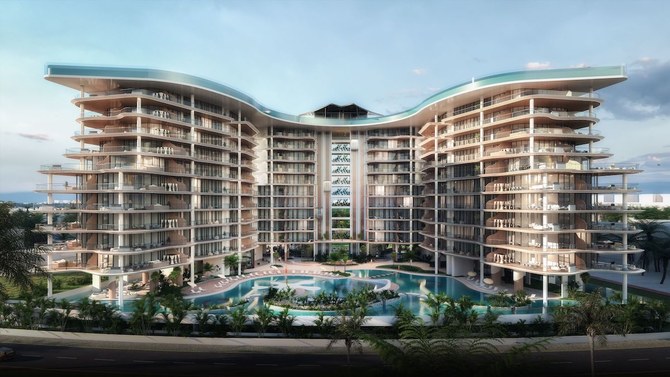
- Manta Bay will mark the company’s first project in Ras Al Khaimah
DUBAI: UAE-based real estate company Major Developers has announced an AED1 billion ($272 million) luxury residential project in Ras Al-Khaimah, Emirates News Agency reported on Tuesday.
Manta Bay will mark the company’s first project in the emirate and represents a major investment in the region’s luxury market.
The company says the development, on the shores of Al-Marjan Island, is inspired by Manta Bay in Indonesia and will be the epitome of exclusivity. It is set to break ground by mid-2024.
“We anticipate that Ras Al-Khaimah will capture a substantial portion of the UAE’s real estate market, supported by its strategic location, extensive infrastructure enhancements and increasing demand,” said Naren Vish, Major Developers’ chief marketing officer, during a press conference at the JW Marriott Hotel Marina in Dubai.
Egyptian FM repeats call for two-state solution
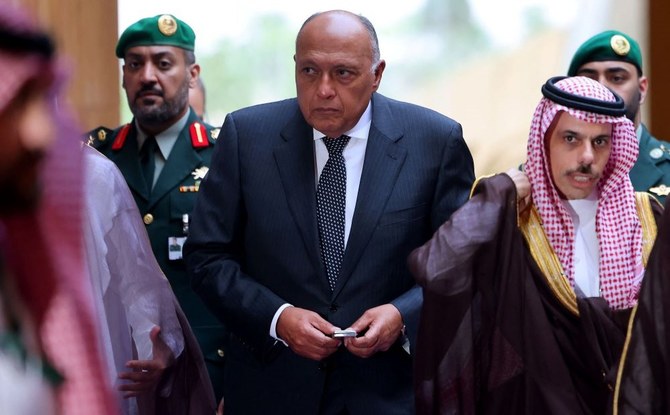
- Sameh Shoukry took part in a ministerial coordination meeting involving Arab and European countries
- Meeting, which discussed recognition of a Palestinian state, was held on the sidelines of the two-day WEF special meeting in Riyadh
CAIRO: Egypt’s foreign minister has repeated his call for a two-state solution to the Palestinian issue.
Sameh Shoukry on Monday took part in a ministerial coordination meeting involving Arab and European countries.
The meeting, which discussed recognition of a Palestinian state, was held on the sidelines of the two-day World Economic Forum special meeting in Riyadh.
Shoukry called on the international community to pressure Israel into ending its occupation of the Palestinian territories, and to support the legitimate and inalienable rights of Palestinians, said Ahmed Abu Zeid, the ministry’s spokesman.
Given the violence in Gaza and tensions in the West Bank, international parties must “assume their legal and human responsibilities to find a serious political horizon to establish a two-state solution and bring just and comprehensive peace to the region,” Shoukry added.
The foreign minister described the two-state solution as the “only path” toward peace between Palestinians and Israelis, as well as stability and coexistence among the peoples of the region.
IAEA chief Grossi to visit Iran May 6-8, Mehr says
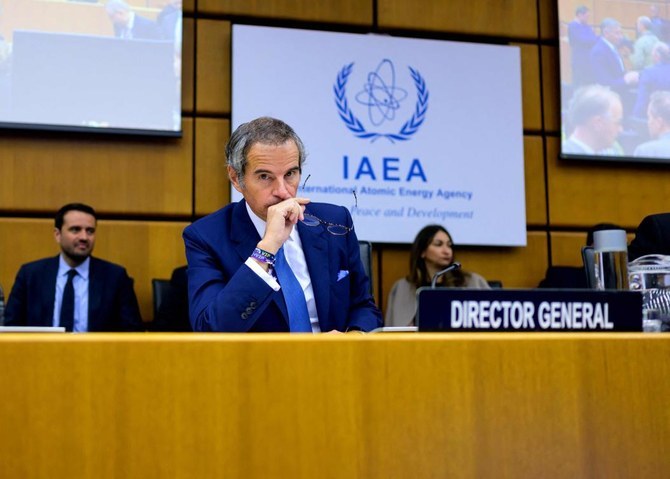
- Grossi will meet Iranian officials in Tehran before participating in the International Conference of Nuclear Sciences and Technologies held in Isfahan
- Enrichment to 60 percent brings uranium close to weapons grade
DUBAI: International Atomic Energy Agency chief Rafael Grossi is scheduled to visit Iran to take part in a nuclear conference from May 6-8 and meet Iranian officials, Iran’s Mehr news agency said on Tuesday.
“Grossi will meet Iranian officials in Tehran before participating in the International Conference of Nuclear Sciences and Technologies held in Isfahan,” the agency reported.
The IAEA chief said in February that he was planning a visit to Tehran to tackle a “drifting apart” in relations between the agency and the Islamic Republic.
Grossi said the same month that while the pace of uranium enrichment by Iran had slowed slightly since the end of last year, Iran was still enriching at an elevated rate of around 7 kg of uranium per month to 60 percent purity.
Enrichment to 60 percent brings uranium close to weapons grade, and is not necessary for commercial use in nuclear power production. Iran denies seeking nuclear weapons but no other state has enriched to that level without producing them.
Under a defunct 2015 agreement with world powers, Iran can enrich uranium only to 3.67 percent. After then-President Donald Trump pulled the United States out of that deal in 2018 and re-imposed sanctions, Iran moved well beyond the deal’s nuclear restrictions.
The IAEA said the 2015 nuclear deal was “all but disintegrated.”



